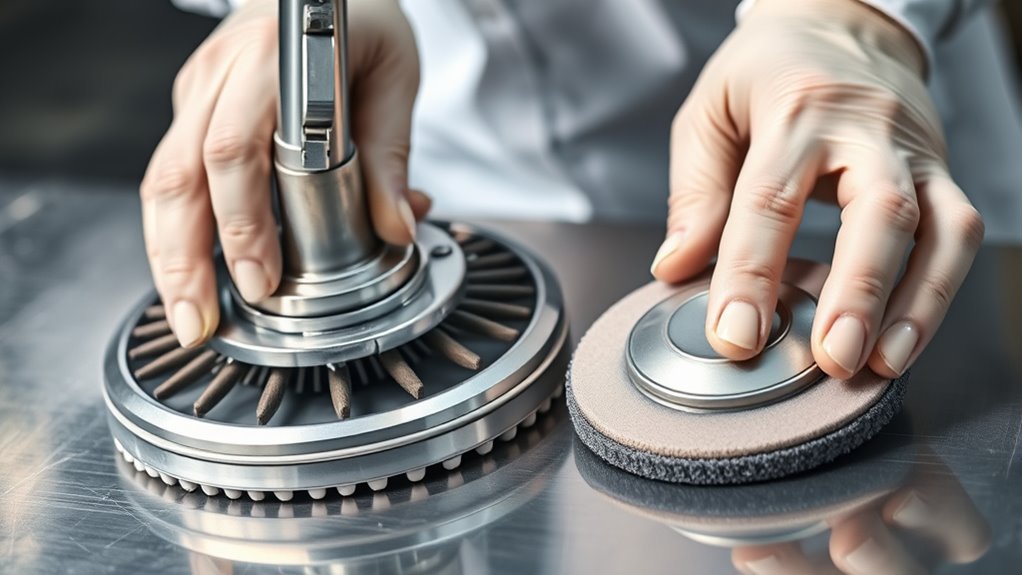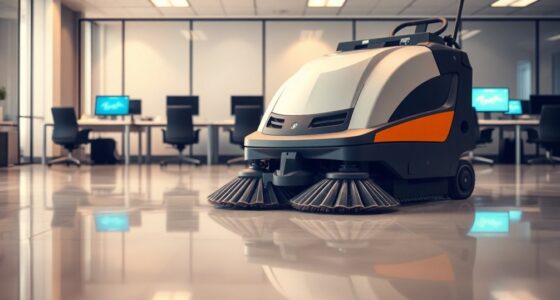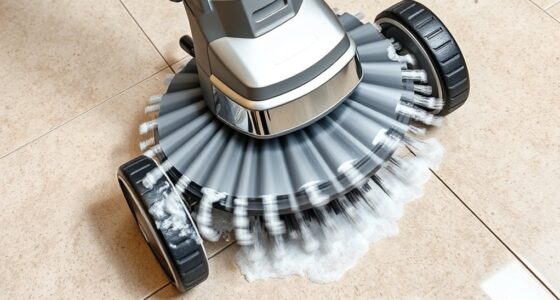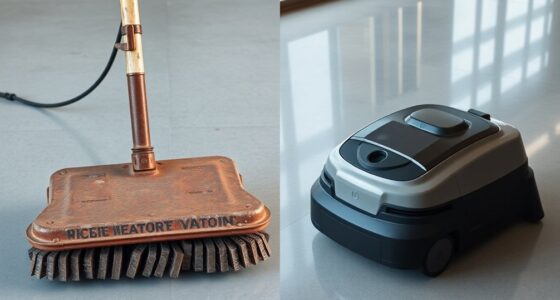Choose an orbital scrubber for gentle cleaning on delicate surfaces like tiles or countertops, especially if you want to avoid scratches. It’s great for light to moderate dirt and abrasive materials, offering safe, even pressure. Opt for a disc scrubber when tackling tough grime or heavy-duty cleaning on durable surfaces such as concrete or industrial floors. For more tips on matching the right scrubber to your cleaning needs, keep exploring the details below.
Key Takeaways
- Use orbital scrubbers for delicate surfaces and light to moderate cleaning tasks to prevent damage.
- Choose disc scrubbers for heavy-duty cleaning on durable surfaces like concrete or tile.
- Orbital scrubbers are ideal for gentle abrasion and surface preservation, while disc scrubbers excel at removing stubborn grime.
- Match scrubber type to the dirt severity: orbital for gentle cleaning, disc for deep, aggressive scrubbing.
- Consider abrasive material presence; orbital scrubbers handle abrasives softly, whereas disc scrubbers handle tough grime efficiently.
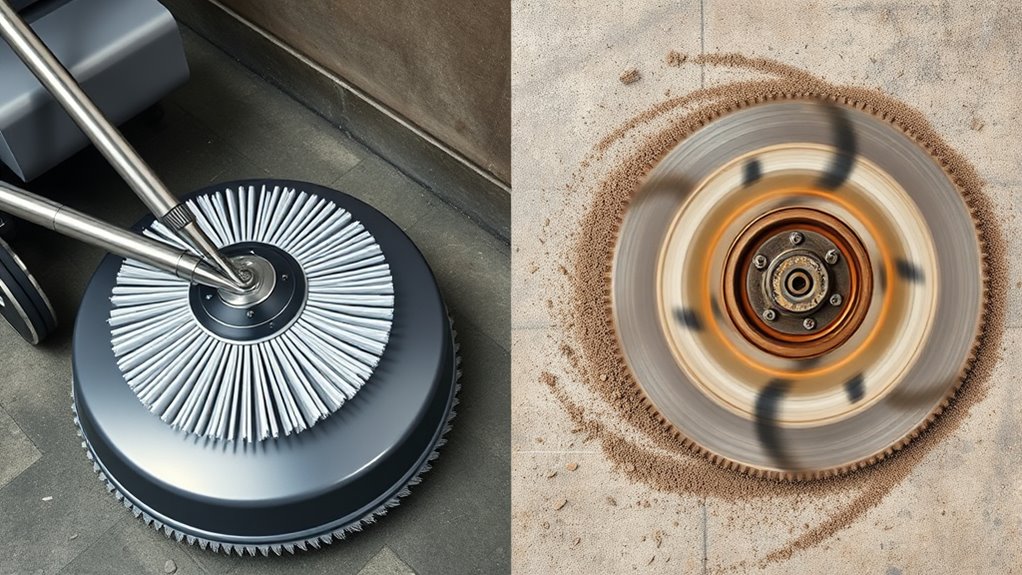
When it comes to surface cleaning, choosing the right scrubber can make all the difference, especially between orbital and disc scrubbers. Your decision hinges on understanding how each tool interacts with abrasive materials and impacts cleaning efficiency. Orbital scrubbers are designed to move in small, circular motions, which allows them to gently but effectively clean a variety of surfaces. They are particularly well-suited for delicate materials because their motion reduces the risk of surface damage. When you’re working with abrasive materials, this gentle action helps prevent scratches and preserves the integrity of the surface while still delivering good cleaning performance. The key advantage here is that orbital scrubbers tend to distribute pressure evenly, which enhances cleaning efficiency without compromising surface quality. They often come with variable speed settings, giving you control over the intensity of scrubbing depending on the stubbornness of dirt or the abrasiveness of the cleaning materials you’re using. If your task involves light to moderate cleaning, especially on sensitive surfaces, orbital scrubbers can be your best choice because they combine safety with effective dirt removal.
On the other hand, disc scrubbers operate with a spinning disc that rotates at high speeds, making them more aggressive in tackling tough grime and heavily soiled surfaces. When you need to deal with abrasive materials—think of thick residues, caked-on dirt, or stubborn stains—disc scrubbers excel because their vigorous spinning action delivers higher cleaning efficiency. They generate significant torque, which helps break down and lift stubborn debris quickly. However, this increased power comes with a trade-off: the risk of surface damage if not used carefully. That’s why disc scrubbers are typically recommended for durable surfaces like concrete, tile, or industrial flooring that can withstand intense abrasion. If you’re cleaning large, heavily soiled areas or surfaces that require deep scrubbing, a disc scrubber will save you time and effort by providing a more aggressive cleaning action. Just be mindful of abrasive materials that might scratch or degrade delicate surfaces, as disc scrubbers tend to be less forgiving than orbital models in such scenarios.
Ultimately, your choice should depend on the surface you’re cleaning and the abrasive materials involved. For delicate or sensitive surfaces, orbital scrubbers offer a safer, more controlled approach that maintains cleaning efficiency without damage. For tougher, more durable surfaces that need heavy-duty cleaning, disc scrubbers deliver the power and speed necessary to get the job done efficiently. By matching the right scrubber to your cleaning task, you ensure excellent results while protecting your surfaces from unnecessary harm.
Frequently Asked Questions
Can Orbital Scrubbers Handle Heavy-Duty Industrial Cleaning?
Think of orbital scrubbers as the Swiss Army knives of industrial cleaning—they’re versatile but may struggle with the toughest grime. For heavy-duty tasks, they handle moderate cleaning well but aren’t designed for extreme industrial cleaning demands. If you want equipment durability and power, consider more robust options like rotary scrubbers. You’ll find orbital scrubbers ideal for regular maintenance, but for intensive industrial cleaning, a dedicated heavy-duty machine is your best bet.
Are Disc Scrubbers Suitable for Delicate Surfaces?
Disc scrubbers aren’t ideal for delicate surfaces since they can be too abrasive. You might risk scratches or damage if you use them for gentle cleaning. Instead, opt for softer tools or specialized cleaning pads designed for delicate surfaces. Always test a small, inconspicuous area first to verify the scrubber won’t harm the material. For safe, gentle cleaning, choose equipment that matches the delicacy of the surface you’re working on.
How Do Maintenance Requirements Differ Between the Two Systems?
You’ll find that orbital scrubbers generally require more frequent maintenance due to their complex parts, but they tend to cost more upfront. Disc scrubbers have simpler mechanisms, so maintenance frequency is lower, and costs are usually less over time. Your choice depends on balancing these factors; if you want lower ongoing costs and less upkeep, disc scrubbers might suit you better, while orbital systems are better for intensive, precise cleaning.
Which Scrubber Type Is More Energy-Efficient?
If you think energy efficiency is a game of who burns less juice, orbital scrubbers take the prize. They consume less energy, slashing your operational costs and making you feel like a savvy eco-warrior. Disc scrubbers, on the other hand, sip power more generously, possibly draining your budget faster than you’d like. So, if saving on energy consumption is your goal, orbital systems are the smarter, greener choice.
Are There Specific Safety Considerations for Each Scrubber Type?
You should prioritize safety by wearing appropriate personal protective equipment, like gloves and eye protection, whenever operating either scrubber type. Be aware of specific risks, such as moving parts or chemical exposure, and follow emergency shutdown procedures closely. Always verify proper training, keep safety guards in place, and perform regular maintenance checks to minimize hazards. Staying vigilant helps prevent accidents and keeps your work environment safe.
Conclusion
So, next time you’re stuck deciding between orbital and disc scrubbers, remember: it’s all about the job’s drama. Want finesse? Go orbital, charm your surface. Need brute force? Grab the disc, release the beast. Either way, you’re the hero in this cleaning saga. Just don’t forget, in the end, it’s your choice—because no scrubber can save you from the mess you made. Happy cleaning, superstar!
